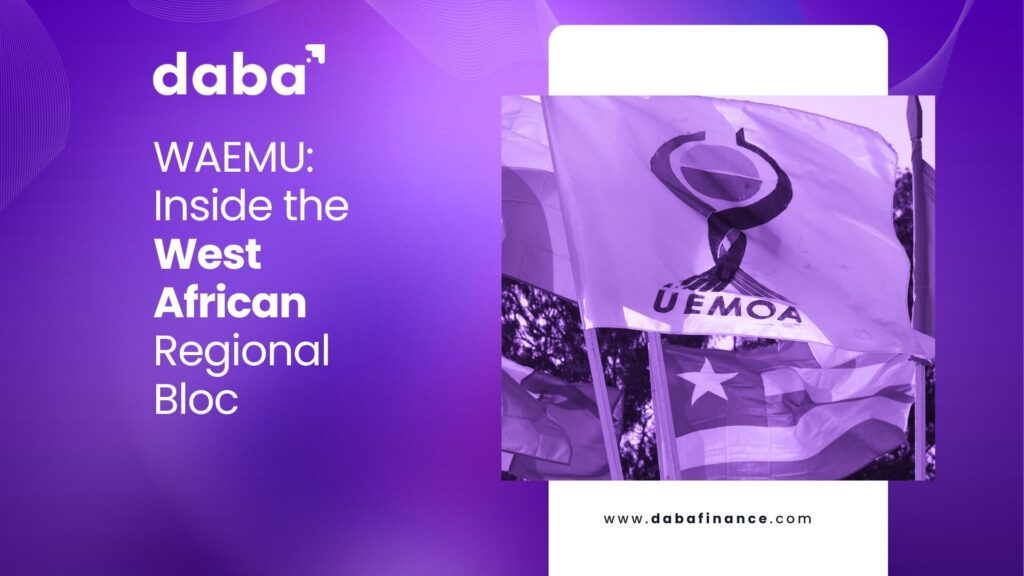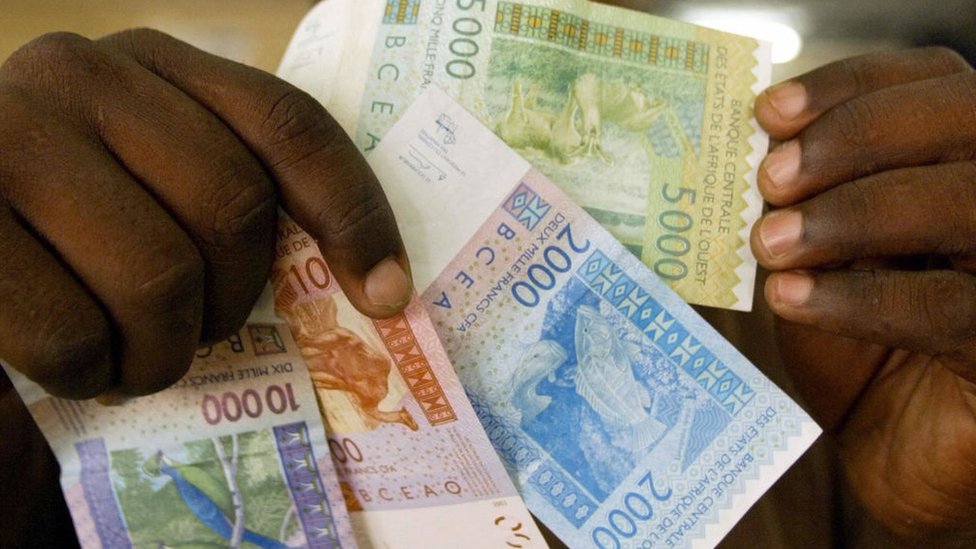WAEMU: Inside the West African Regional Bloc
6 min Read August 18, 2024 at 10:35 AM UTC

The regional bloc’s members include the eight francophone West African countries and offers lessons for regional integration efforts on the continent.
The West African Economic and Monetary Union, commonly known by its French acronym UEMOA (Union Économique et Monétaire Ouest-Africaine) or its English acronym WAEMU, is a significant regional organization in West Africa.
This article provides an overview of WAEMU, addressing key aspects of its structure, functions, and impact on regional integration.
How Many Countries are in the WAEMU?
WAEMU comprises eight member states: Benin, Burkina Faso, Côte d’Ivoire, Guinea-Bissau, Mali, Niger, Senegal, and Togo.
The union was officially established on January 10, 1994, building upon the foundation of the West African Monetary Union (UMOA) created in 1962. Guinea-Bissau joined in 1997, expanding the initial group of seven to eight members.
What is the Purpose and Functions of WAEMU?
WAEMU’s primary objective is to foster economic integration among its member states. It aims to create a harmonized and integrated economic space in West Africa, ensuring the free movement of people, capital, goods, services, and factors of production.
The union works towards enhancing the competitiveness of member economies within an open and competitive market framework, while also streamlining and harmonizing the legal environment across the region.
You can follow Daba’s reporting on Africa on WhatsApp. Sign up here.
Key functions of WAEMU include:
- Coordinating economic and monetary policies
- Implementing common sectoral policies
- Harmonizing legislation, particularly regarding taxation
- Creating a common market
- Coordinating national macroeconomic policies
What is the Currency of the WAEMU?
WAEMU countries share a common currency, the West African CFA franc (XOF).
This currency is pegged to the euro, a legacy of the region’s colonial ties to France. The Central Bank of West African States (BCEAO) manages the monetary policy for all WAEMU members.
The use of a common currency is intended to facilitate trade and investment within the union by eliminating exchange rate risks and reducing transaction costs.
However, it also means that member countries cannot independently adjust their monetary policies to address country-specific economic challenges.

Differences Between WAEMU and ECOWAS
While WAEMU is focused on economic and monetary integration among its eight francophone members, the Economic Community of West African States (ECOWAS) is a larger regional group that includes all WAEMU countries plus seven others.
ECOWAS aims for broader regional cooperation and integration beyond just economic matters.
The key differences include:
- Scope: WAEMU focuses primarily on economic and monetary integration, while ECOWAS has a broader mandate including political cooperation and security.
- Membership: WAEMU has 8 members, all of which use the CFA franc, while ECOWAS has 15 members with various currencies.
- Depth of integration: WAEMU has achieved deeper economic integration, including a common currency and harmonized economic policies, while ECOWAS is still working towards these goals.
Also Read: West Africa’s Brexit – Insights into ECOWAS Breakup
What are the Benefits of WAEMU?
WAEMU offers several potential benefits to its member states:
Monetary stability: The common currency and shared monetary policy aim to provide price stability and low inflation rates across the region.
Facilitated trade: The elimination of currency exchange risks and reduced transaction costs should theoretically promote intra-regional trade.
Economic policy coordination: Harmonized economic policies can lead to more stable and predictable business environments across the region.
Collective bargaining power: As a bloc, WAEMU countries may have stronger negotiating positions in international economic matters.
Regional infrastructure development: The union can coordinate and fund regional infrastructure projects that benefit multiple member states.
You can follow Daba’s reporting on Africa on WhatsApp. Sign up here
The BRVM: WAEMU’s Regional Stock Exchange
An important element of WAEMU’s financial integration is the Bourse Régionale des Valeurs Mobilières (BRVM), or Regional Securities Exchange.
Established in 1998 and headquartered in Abidjan, Côte d’Ivoire, the BRVM is a unique regional stock exchange serving all eight WAEMU member countries. It’s the only stock exchange in the world that serves multiple countries with a common currency.
The BRVM plays a crucial role in WAEMU’s financial ecosystem by providing a platform for companies to raise capital and for investors to trade securities across the region. It lists a variety of financial instruments, including stocks, bonds, and other securities.
Also Read: BRVM – The Gateway to West Africa’s Potential
The exchange operates in French, reflecting the predominant language of the WAEMU region, and all transactions are conducted in the common CFA franc currency.
Despite its potential, the BRVM faces challenges typical of frontier markets, including limited liquidity and a relatively small number of listed companies. However, it represents a significant step towards financial integration within WAEMU and has the potential to become an increasingly important tool for mobilizing capital for regional development.
As WAEMU continues to pursue economic integration, the role of the BRVM in facilitating cross-border investment and providing a regional platform for capital raising is likely to grow in importance.
Sign up here for our weekly Next Frontier newsletter
Lessons from WAEMU on Regional Integration
WAEMU’s experience offers several important lessons for regional integration efforts:
Currency union alone is not sufficient: Despite sharing a common currency, WAEMU countries have not seen the expected boost in intra-regional trade or investment. This suggests that other barriers, such as inadequate infrastructure and complex customs procedures, play a significant role in hindering regional economic integration.
Economic diversity matters: WAEMU countries have similar economic structures, often competing in the same export markets rather than complementing each other. This limits the potential for intra-regional trade and economic diversification.
External dependencies persist: The region’s continued economic ties to France and the euro peg have been criticized as limiting economic sovereignty and flexibility.
Political will is crucial: Successful integration requires sustained political commitment from all member states to implement and enforce agreed-upon policies.
Balancing national and regional interests: The experience of WAEMU highlights the challenges of aligning diverse national economic priorities with regional integration goals.
Need for comprehensive approach: Effective regional integration requires addressing multiple factors simultaneously, including infrastructure development, harmonization of regulations, and removal of non-tariff barriers.
Importance of monitoring and enforcement: The implementation of regional policies and agreements needs to be consistently monitored and enforced to achieve desired outcomes.
Sign up here for our weekly Next Frontier newsletter
Challenges and Future Prospects of WAEMU
Despite its long-standing existence, WAEMU faces several challenges. Intra-regional trade remains relatively low, and member economies continue to be heavily dependent on commodity exports to markets outside Africa. The region also grapples with security issues, particularly in the Sahel, which impact economic activities and integration efforts.
Looking ahead, WAEMU is working on deepening integration through initiatives like the creation of a regional stock exchange and efforts to harmonize business laws. The union is also increasing its focus on security cooperation, recognizing the link between stability and economic development.
In conclusion, WAEMU represents an ambitious attempt at regional economic integration in West Africa. While it has achieved some successes, particularly in maintaining monetary stability, the union’s experience underscores the complexities of regional integration.
As Africa moves towards broader continental integration through initiatives like the African Continental Free Trade Area (AfCFTA), the lessons from WAEMU will be valuable in shaping effective strategies for economic cooperation and development across the continent.
This material has been presented for informational and educational purposes only. The views expressed in the articles above are generalized and may not be appropriate for all investors. The information contained in this article should not be construed as, and may not be used in connection with, an offer to sell, or a solicitation of an offer to buy or hold, an interest in any security or investment product. There is no guarantee that past performance will recur or result in a positive outcome. Carefully consider your financial situation, including investment objective, time horizon, risk tolerance, and fees prior to making any investment decisions. No level of diversification or asset allocation can ensure profits or guarantee against losses. Articles do not reflect the views of DABA ADVISORS LLC and do not provide investment advice to Daba’s clients. Daba is not engaged in rendering tax, legal or accounting advice. Please consult a qualified professional for this type of service.

Next Frontier
Stay up to date on major news and events in African markets. Delivered weekly.
Pulse54
UDeep-dives into what’s old and new in Africa’s investment landscape. Delivered twice monthly.
Events
Sign up to stay informed about our regular webinars, product launches, and exhibitions.

